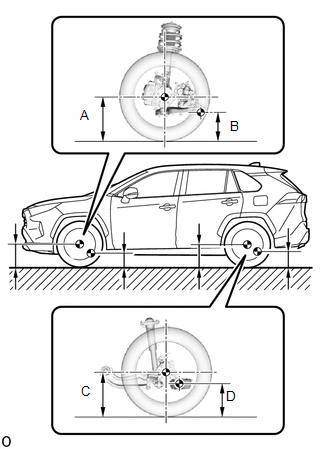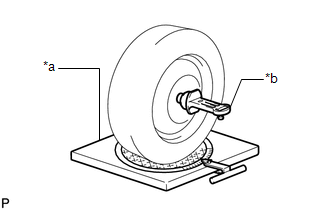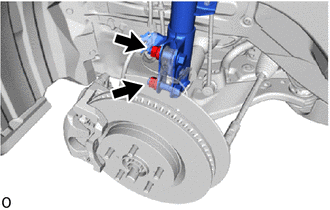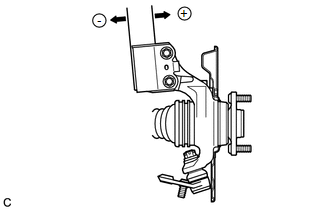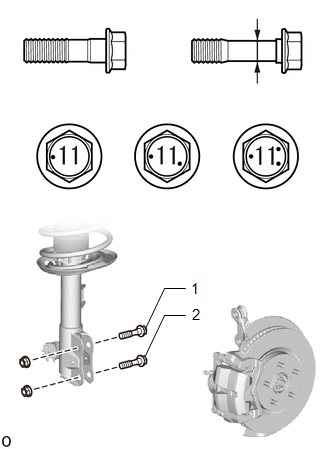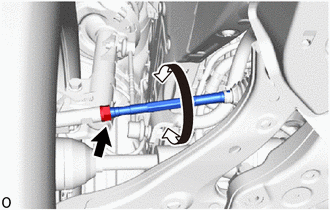- Perform "Reset Memory".
- Perform acceleration sensor zero point calibration and store system information memorization.
| Last Modified: 01-30-2024 | 6.11:8.1.0 | Doc ID: RM10000000224GL |
| Model Year Start: 2022 | Model: RAV4 | Prod Date Range: [12/2021 - ] |
| Title: ALIGNMENT / HANDLING DIAGNOSIS: FRONT WHEEL ALIGNMENT: ADJUSTMENT; 2022 - 2024 MY RAV4 RAV4 HV [12/2021 - ] | ||
ADJUSTMENT
CAUTION / NOTICE / HINT
The necessary procedures (adjustment, calibration, initialization, or registration) that must be performed after completing the front wheel alignment procedure are shown below.
Necessary Procedures After Adjustment
|
Replaced Part or Performed Procedure |
Necessary Procedure |
Effect/Inoperative Function when Necessary Procedure not Performed |
Link |
|---|---|---|---|
|
Front wheel alignment adjustment |
w/ Vacuum brake booster |
|
|
|
w/o Vacuum brake booster
|
|
CAUTION / NOTICE / HINT
Standard (Unloaded Vehicle)
|
Destination |
North America |
Mexico |
|||||
|
Tire Size |
225/65R17 |
225/60R18 |
235/55R19 |
225/65R17 |
225/60R18 |
235/55R19 |
|
|
Front Vehicle Height |
A - B |
117 mm (4.606 in.) |
117 mm (4.606 in.) |
117 mm (4.606 in.) |
133 mm (5.236 in.) |
133 mm (5.236 in.) |
133 mm (5.236 in.) |
|
Rear Vehicle Height |
C - D |
41 mm (1.614 in.) |
41 mm (1.614 in.) |
41 mm (1.614 in.) |
60 mm (2.362 in.) |
60 mm (2.362 in.) |
60 mm (2.362 in.) |
|
Camber |
-0°05' (-0.08°) |
-0°05' (-0.08°) |
-0°05' (-0.08°) |
-0°20' (-0.33°) |
-0°20' (-0.33°) |
-0°20' (-0.33°) |
|
|
Caster |
4°55' (4.92°) |
4°55' (4.92°) |
4°55' (4.92°) |
5°00' (5.00°) |
5°00' (5.00°) |
5°00' (5.00°) |
|
|
Steering Axis Inclination (Reference) |
12°05' (12.08°) |
12°05' (12.08°) |
12°05' (12.08°) |
12°30' (12.50°) |
12°30' (12.50°) |
12°30' (12.50°) |
|
|
Toe-in |
mm |
2.3 mm (0.091 in.) |
2.3 mm (0.091 in.) |
2.3 mm (0.091 in.) |
2.5 mm (0.098 in.) |
2.5 mm (0.098 in.) |
2.6 mm (0.102 in.) |
|
deg |
0°12' (0.20°) |
0°12' (0.20°) |
0°12' (0.19°) |
0°13' (0.22°) |
0°13' (0.22°) |
0°13' (0.22°) |
|
|
Tire Turning Angle |
Inside |
37°40' (37.67°) |
37°40' (37.67°) |
35°40' (35.67°) |
37°15' (37.25°) |
37°15' (37.25°) |
35°15' (35.25°) |
|
Outside |
32°25' (32.42°) |
32°25' (32.42°) |
31°05' (31.08°) |
32°10' (32.17°) |
32°10' (32.17°) |
30°50' (30.83°) |
|
Tolerance
|
Camber |
+/- 45' (0.75°) |
|
|
Caster |
+/- 45' (0.75°) |
|
|
Toe-in |
mm |
+/- 2 mm (0.079 in.) |
|
deg |
+/- 10' (0.17°) |
|
|
Tire Turning Angle |
Inside |
+/- 2° |
Left-right Difference
|
Camber |
45' (0.75°) or less |
|
Caster |
45' (0.75°) or less |
PROCEDURE
1. INSPECT TIRES
2. MEASURE VEHICLE HEIGHT
NOTICE:
- Before inspecting the wheel alignment, adjust the vehicle height to the specified value.
- Be sure to perform measurement on a level surface.
- If it is necessary to go under the vehicle for measurement, confirm that the parking brake is applied and the vehicle is secured with chocks.
- Inspect while the vehicle is unloaded.
- The standard value shown here is a value that is used for performing a wheel alignment and does not indicate the height of an actual vehicle.
(a) Bounce the vehicle up and down at the corners to stabilize the suspension.
|
(b) Measure the vehicle height. Check the values in the top table. Measurement Points:
|
|
3. INSPECT CAMBER, CASTER AND STEERING AXIS INCLINATION
NOTICE:
Inspect while the vehicle is unloaded.
|
(a) Install a camber-caster-kingpin gauge and place the front wheels on the center of a turning radius gauge. |
|
(b) Inspect the camber, caster and steering axis inclination.
Check the values in the top table.
4. ADJUST CAMBER
NOTICE:
Inspect toe-in after the camber has been adjusted.
(a) Remove the front wheel.
|
(b) Remove the 2 nuts on the lower side of the front shock absorber assembly. NOTICE: Keep the bolts inserted. |
|
(c) Remove the top and bottom bolts one at a time and confirm that the steering knuckle can move freely in the front shock absorber assembly.
HINT:
- Reinstall each bolt after removing it and confirming steering knuckle movement.
- If the steering knuckle does not move freely in the front shock absorber assembly, clean the contact surfaces of the front shock absorber assembly and the steering knuckle.
(d) Temporarily install the 2 nuts. (Step A)
|
(e) Fully push or pull the front axle hub in the direction of the required adjustment. (Step B) |
|
|
(f) Tighten the 2 nuts. Torque: 290 N·m {2957 kgf·cm, 214 ft·lbf} NOTICE: Keep the bolts from rotating when tightening the nuts. |
|
(g) Install the front wheel.
(h) Bounce the vehicle up and down at the corners to stabilize the suspension.
(i) Check the camber.
Check the values in the top table.
|
(1) If the measured value is not within the specification, calculate the required adjustment amount using the formula below. Camber adjustment amount = center of the specified range - measured value Check the combination of the installed bolts. Select appropriate bolts from the tables below to adjust the camber to the specified values. HINT: Try to adjust the camber to the center of the specified values.
The vehicle body and suspension may be damaged if the camber cannot be correctly adjusted according to the table above. NOTICE: Replace the nut with a new one when replacing the bolt. |
|
(2) Table (1) (To move the axle hub toward the positive side)
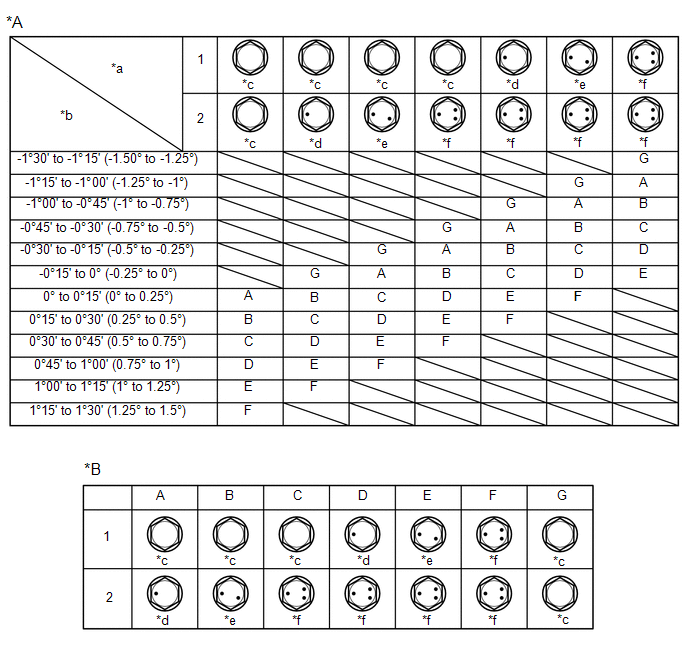
|
*A |
Table (1) (To move the axle hub toward the positive side) |
*B |
Selected Bolt Combination |
|
*a |
Installed Bolt |
*b |
Adjusting Value |
|
*c |
Standard Bolt |
*d |
90105-17013 |
|
*e |
90105-17014 |
*f |
90105-17015 |
(3) Table (2) (To move the axle hub toward the negative side)
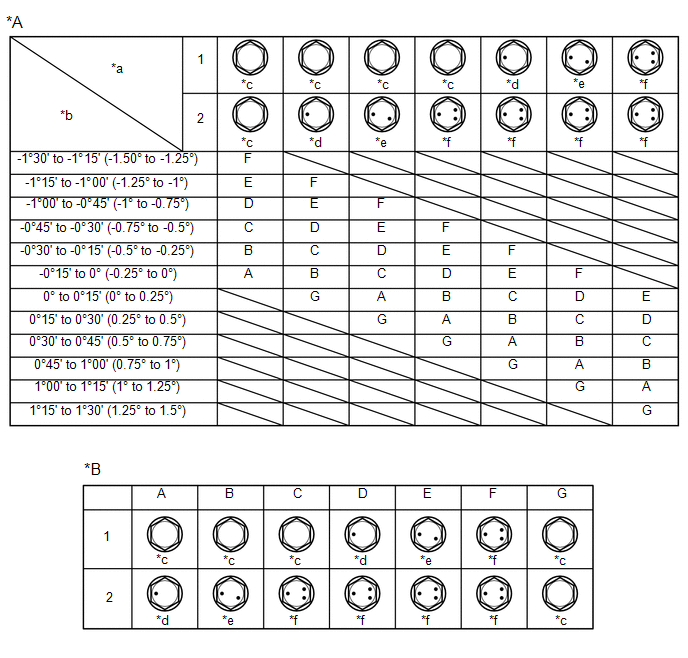
|
*A |
Table (2) (To move the axle hub toward the negative side) |
*B |
Selected Bolt Combination |
|
*a |
Installed Bolt |
*b |
Adjusting Value |
|
*c |
Standard Bolt |
*d |
90105-17013 |
|
*e |
90105-17014 |
*f |
90105-17015 |
(j) If the camber was out of adjustment in the previous step, perform the adjust camber steps mentioned above. In step A, replace the existing bolts with the selected bolts.
HINT:
Replace one bolt at a time when replacing both bolts.
5. INSPECT TOE-IN
NOTICE:
Inspect while the vehicle is unloaded.
(a) Bounce the vehicle up and down at the corners to stabilize the suspension.
(b) Release the parking brake and move the shift lever to N (for Automatic transaxle, Hybrid transaxle).
(c) Put tread center marks on the rearmost points of the front wheels and measure the distance between the marks (dimension B).
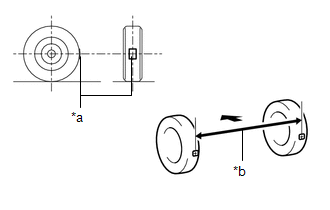
|
*a |
Tread Center Mark |
|
*b |
Dimension B |

|
Front of the Vehicle |
(d) Slowly push the vehicle straight ahead to cause the front wheels to rotate 180°. Use the front tire valve as a reference point.
HINT:
Do not allow the wheels to rotate more than 180°. If the wheels rotate more than 180°, perform the procedure from step C again.
(e) Measure the distance between the tread center marks on the front of the wheels (dimension A).
Check the values in the top table.
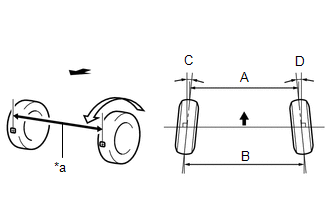
|
*a |
Dimension A |

|
Front of the Vehicle |
HINT:
Measure "B - A" only when "C + D" cannot be measured.
If the toe-in is not within the specified range, adjust it at the steering rack ends.
6. ADJUST TOE-IN
(a) Separate the steering rack boot clips from the steering rack boot.
|
(b) Loosen the tie rod end sub-assembly lock nuts. |
|
(c) Turn the right and left steering rack ends by an equal amount to adjust the toe-in.
Check the values in the top table.
HINT:
- If the toe-in measurement is more than the specified range, shorten the left and right steering rack ends until the measurement is within the specified range.
- If the toe-in measurement is less than the specified range, extend the left and right steering rack ends until the measurement is within the specified range.
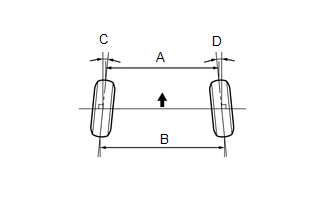

|
Front of the Vehicle |
HINT:
Perform adjustments so that the value is as close as possible to the median of the specified range.
(d) Make sure that the thread length of the right and left steering rack ends are the same.
(e) Tighten the tie rod end sub-assembly lock nuts.
(f) Place the steering rack boots on the seats and install the steering rack boot clips.
(1) for LH side:
(2) for RH side:
HINT:
Perform the same procedure as for the LH side.
7. INSPECT WHEEL ANGLE
(a) Put tread center marks on the rearmost points of a turning radius gauge.
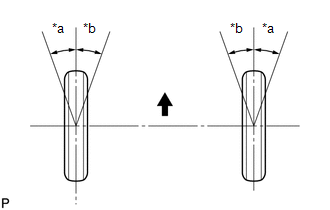
|
*a |
Inside |
|
*b |
Outside |

|
Front of the Vehicle |
(b) Turn the steering wheel fully to the left and right and measure the turning angle.
Check the values in the top table.
NOTICE:
Inspect while the vehicle is unloaded.
- If the right and left inside wheel angles differ from the specified value, check and adjust the right and left steering rack end lengths.
8. ELECTRONICALLY CONTROLLED BRAKE SYSTEM CALIBRATION
|
|
|
![2019 - 2024 MY RAV4 RAV4 HV [11/2018 - ]; BRAKE CONTROL / DYNAMIC CONTROL SYSTEMS: ELECTRONICALLY CONTROLLED BRAKE SYSTEM (w/ Vacuum Brake Booster): UTILITY](/t3Portal/stylegraphics/info.gif)
